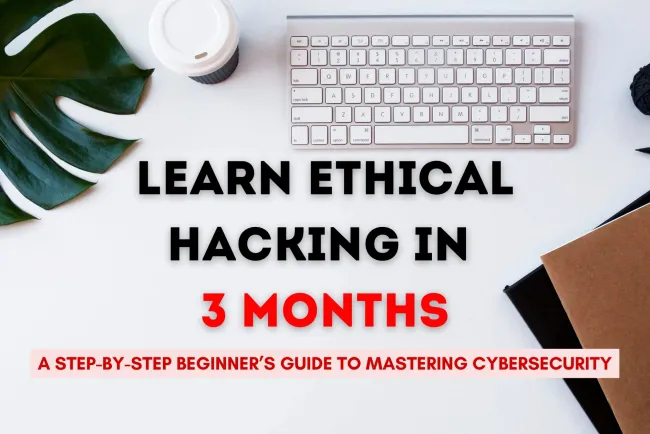Best Laptops for Cybersecurity Certifications (CEH, OSCP, CompTIA Security+) | 2025 Buyer’s Guide for Ethical Hacking and Penetration Testing
Best laptops for cybersecurity certifications 2025, laptops for CEH OSCP, cybersecurity laptop requirements, penetration testing laptop, ethical hacking laptop for students, best laptops for Kali Linux, and affordable cybersecurity laptops are the most searched terms by aspiring ethical hackers and cybersecurity professionals. This blog helps you choose the right laptop for learning and practicing cybersecurity certifications such as CEH, OSCP, CompTIA Security+, and CISSP in 2025. It covers essential laptop specs, real-time usage, Linux compatibility, VM support, and GPU requirements for tools like Kali Linux, Metasploit, Wireshark, and Hashcat. Whether you’re a student or working professional, discover the best laptop options for your cyber journey.

Table of Contents
- Why the Right Laptop Matters for Cybersecurity Certifications
- Recommended Specifications for a Cybersecurity Laptop in 2025
- Top Laptop Picks for Cybersecurity Certifications in 2025
- Real-World Scenarios for Laptop Use
- Best Budget Laptops for Cybersecurity Students
- Tools You’ll Run on These Laptops
- Tips for Choosing the Right Cybersecurity Laptop
- Conclusion
- Frequently Asked Questions (FAQs)
Looking for the best laptops for cybersecurity certifications like CEH and OSCP in 2025? This detailed blog covers top laptop models, recommended specifications, real-world use cases, and buying tips for ethical hacking students and professionals. Whether you're pursuing Certified Ethical Hacker (CEH), Offensive Security Certified Professional (OSCP), or CompTIA Security+, find out which laptops are perfect for running tools like Kali Linux, VMware, Burp Suite, and Metasploit. Learn how to choose a machine that supports virtualization, dual boot, Wi-Fi hacking, and GPU cracking.
Why the Right Laptop Matters for Cybersecurity Certifications
Choosing the right laptop is crucial for passing certifications like CEH, OSCP, and Security+, because they require real-world, hands-on training. A typical cybersecurity laptop must:
-
Run Kali Linux, Parrot OS, or Windows with WSL2
-
Support VMware/VirtualBox
-
Handle penetration testing tools and network simulations
-
Be compatible with external Wi-Fi adapters
-
Offer good battery life and thermal performance
Recommended Specifications for a Cybersecurity Laptop in 2025
| Component | Recommended Specification |
|---|---|
| Processor (CPU) | Intel i7 / AMD Ryzen 7 or higher with virtualization support |
| RAM | Minimum 16 GB (32 GB preferred for OSCP or heavy VM usage) |
| Storage | 512 GB SSD (1 TB preferred for dual boot or multiple VMs) |
| Graphics (GPU) | Optional, but ideal for password cracking tools like Hashcat |
| Display | 14–15.6” Full HD, anti-glare for long hours of use |
| Ports | USB 3.0, USB-C, HDMI, Ethernet, Wi-Fi chipset compatible |
| Build Quality | Durable, portable, and upgradeable |
Top Laptop Picks for Cybersecurity Certifications in 2025
Lenovo ThinkPad X1 Carbon Gen 11
-
Extremely lightweight and Linux-compatible
-
Up to Intel i7, 32GB RAM, 1TB SSD
-
Ideal for OSCP candidates and mobile cybersecurity pros
Dell XPS 15
-
Excellent build, screen, and thermals
-
Supports Kali Linux and dual boot setups
-
Perfect for penetration testers and red teamers
Framework Laptop 13
-
Modular, repairable, and hacker-friendly
-
Compatible with major Linux distributions
-
Highly recommended for ethical hackers
ASUS ROG Zephyrus G14
-
High-end Ryzen 9 CPU with NVIDIA RTX GPU
-
Excellent for running Hashcat and GPU-accelerated tools
-
Portable yet powerful – ideal for OSCP labs
HP Spectre x360
-
2-in-1 convertible for versatile use
-
Intel i7, 16GB RAM, and premium design
-
Best for professionals and part-time learners
Acer Predator Helios 300
-
Budget-friendly but highly capable
-
Great for students preparing for CEH or Security+
-
Handles VMs and security tools smoothly
Real-World Scenarios for Laptop Use
CEH Preparation
-
Runs Metasploit, Nmap, Wireshark, and Burp Suite
-
Requires moderate specs, usually 16GB RAM and i5/i7 processor
OSCP Labs
-
Multiple VMs running simultaneously
-
Heavy usage of Kali Linux, Nmap, Hydra, Exploit-DB scripts
Red Teamers
-
Use of Hashcat and John the Ripper for password cracking
-
High-end GPU and fast SSD required
Best Budget Laptops for Cybersecurity Students
If you’re a beginner or college student:
-
Lenovo IdeaPad Gaming 3 – Upgrade RAM for better VM performance
-
Dell Inspiron 15 Ryzen 5 – Great for dual boot and CEH practice
-
Acer Aspire 7 – Decent specs and affordable price
Tools You’ll Run on These Laptops
-
Kali Linux, Parrot OS
-
Metasploit Framework
-
Burp Suite, Nmap, Hydra, Wireshark
-
Hashcat, John the Ripper
-
VMware, VirtualBox
Tips for Choosing the Right Cybersecurity Laptop
-
Ensure Linux compatibility with Wi-Fi cards, GPU, and drivers
-
Prefer SSD over HDD for faster boot and better VM speed
-
If you're unsure, dual boot instead of running full Linux
-
Join forums like Reddit r/hacking or Linux communities for model support
Conclusion
Choosing the best laptop for cybersecurity certifications like CEH and OSCP in 2025 is essential for hands-on, real-world skill-building. Whether you’re a beginner or professional, the right machine will help you run multiple virtual machines, use advanced penetration testing tools, and simulate real-world attack scenarios. Focus on performance, Linux compatibility, and budget to get the most out of your cybersecurity journey.
Frequently Asked Questions
What are the minimum laptop requirements for CEH certification?
A laptop with at least an Intel i5 or Ryzen 5 processor, 8–16 GB RAM, and a 512 GB SSD is recommended for CEH practice.
Do I need a powerful GPU for cybersecurity learning?
A GPU is not mandatory unless you're running GPU-intensive tools like Hashcat. For basic training, integrated graphics is enough.
Which OS is best for cybersecurity students – Windows or Linux?
Linux is preferred, especially Kali Linux or Parrot OS, but dual booting with Windows is great for flexibility.
Is it necessary to use Kali Linux for ethical hacking?
Yes, Kali Linux is the most used OS in ethical hacking and comes preloaded with many security tools.
Can I use a MacBook for penetration testing and OSCP?
MacBooks can work, especially with Parallels or VMware, but Linux compatibility and Wi-Fi adapter support may be limited.
What is virtualization and why is it important in cybersecurity?
Virtualization allows running multiple operating systems on one machine, which is essential for penetration testing labs.
How much RAM is ideal for cybersecurity VMs?
16 GB is the standard for smooth performance, but 32 GB is better for running multiple virtual machines.
Are gaming laptops good for cybersecurity and ethical hacking?
Yes, gaming laptops have powerful hardware and cooling, making them great for running tools and virtual environments.
What laptops are best for running Hashcat or password cracking tools?
Laptops with NVIDIA RTX series GPUs are best for GPU-based password cracking.
Is Wi-Fi card compatibility important for ethical hacking?
Yes, your laptop must support external Wi-Fi adapters like Alfa AWUS036ACH for packet injection and monitoring mode.
Can I learn OSCP on a budget laptop?
Yes, but you may face slowdowns. Aim for at least 16 GB RAM and an SSD. Dual boot with Kali Linux if possible.
Is it better to buy a desktop or laptop for cybersecurity learning?
Laptops offer mobility, but desktops can be more powerful and upgradeable for the same price.
Should I use VMware or VirtualBox for CEH and OSCP training?
Both work, but VMware offers better performance and networking flexibility for pen testing.
Can I install Kali Linux on any laptop?
Not all laptops have drivers that are compatible with Kali Linux. Research model compatibility first.
Is Framework Laptop good for ethical hacking?
Yes, it’s modular, Linux-friendly, and great for long-term learning and hacking.
What is the best laptop brand for cybersecurity in 2025?
Lenovo ThinkPads, Dell XPS, ASUS ROG, and Framework laptops are highly recommended.
Can Chromebook be used for learning cybersecurity?
Not directly, but some models can run Linux or support virtual machines after rooting.
How many VMs can I run with 16 GB RAM?
You can comfortably run 2–3 VMs with 16 GB RAM, depending on their configurations.
Is dual boot better than virtualization for hacking labs?
Dual boot gives better performance, while virtualization offers convenience. Use based on your needs.
Do cybersecurity professionals need touchscreen laptops?
No, it’s not necessary. Focus on processing power, RAM, and compatibility instead.
What screen size is best for cybersecurity students?
14–15.6 inches with Full HD resolution is ideal for multitasking and tool usage.
Do I need Ethernet port for learning ethical hacking?
It’s useful for network simulations and speed stability but not mandatory if you use USB-Ethernet adapters.
What should I upgrade first—RAM or storage—for hacking practice?
Upgrade RAM first to ensure smooth VM performance, then SSD for faster boot and load times.
Is it safe to run hacking tools on my primary OS?
No, always isolate tools in a VM or secondary OS to avoid damaging your host system.
Can I use external drives for ethical hacking tools?
Yes, you can store tools, payloads, and even bootable OS versions on external SSDs or USBs.
Should cybersecurity learners buy new or refurbished laptops?
Refurbished laptops are fine if they meet hardware requirements and are Linux-compatible.
Do I need a laptop with TPM for cybersecurity work?
Not required for learning or CEH/OSCP, but useful for security-conscious professionals and enterprises.
How much does a good cybersecurity laptop cost in 2025?
Anywhere between ₹50,000 to ₹1,20,000 INR ($600 to $1500), depending on specs and use case.
What is the most important spec in a laptop for OSCP labs?
RAM and CPU with virtualization support (Intel VT-x or AMD-V) are essential.
Is battery life important for cybersecurity professionals?
Yes, especially if you're on the go or attending training sessions, but performance is the top priority.












![Top 10 Ethical Hackers in the World [2025]](https://www.webasha.com/blog/uploads/images/202408/image_100x75_66c2f983c207b.webp)

![[2025] Top 100+ VAPT Interview Questions and Answers](https://www.webasha.com/blog/uploads/images/image_100x75_6512b1e4b64f7.jpg)









